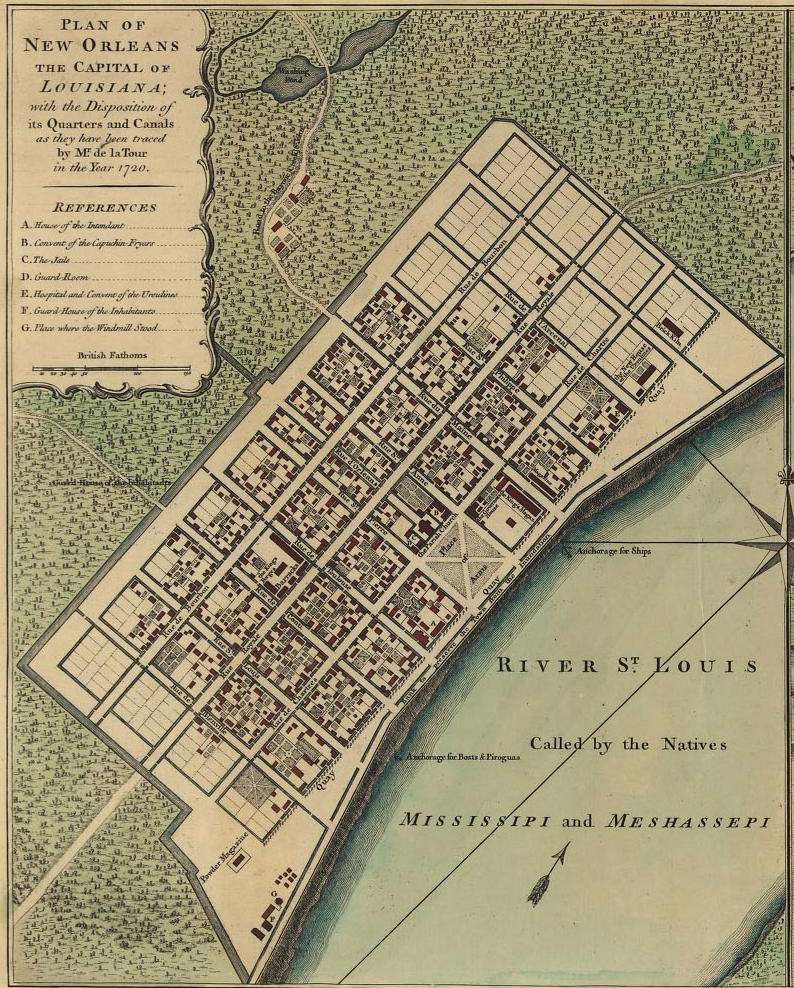In Paris, France, U.S. Minister to France Robert Livingston writes to President Jefferson explaining his plans to solve Spain’s closure of New Orleans to commercial traffic. In Virginia, Jefferson arrives at Monticello having set a plan of Western acquisition and exploration into motion.
Plan of New Orleans: The Capital of Louisiana (1720)
by Pierre Le Blond de La Tour
Wikimedia Commons accessed 26 May 2022.
Pierre Le Blond de La Tour (1673–1723 or 24), was part of a team of French engineers and architects sent to develop Louisiana’s infrastructure. He worked on the layout of New Orleans and Biloxi, and improved navigation of the Mississippi.[1]“Pierre Le Blond de La Tour,” Wikipedia, en.wikipedia.org/wiki/Pierre_Le_Blond_de_La_Tour accessed 26 May 2022.
Livingston’s Negotiations
Paris 11. March 1803
Dear Sir
I have hinted at making the Island of New Orleans an independant State under the government of Spain, France, & the United States with a right of depot to each, subject to a duty on imports 1½ pr. Cent in lieu of storage warfage &c. suggesting the advantages that France would derive from this as being the only manufacturing Nation of the three, the advantages of this to our carrying trade (while it left our revenue untouched) are obvious, and in such a Treaty arrangements might be made extremely advantageous to the western people.
Things every day look more towards a rupture between this country & Britain, & tho the politicians think otherwise I believe a war not very distant . . . . I am Dear Sir with the highest consideration Your Most Obt hume: Servt
Robt R Livingston[2]Original letter partially in code. Robert R. Livingston to James Madison, Founders Online, National Archives, founders.archives.gov/documents/Madison/02-04-02-0484. [Original source: The Papers of … Continue reading
Monticello Arrival
With Congress in recess, Jefferson left Washington City 7 March and marked his home arrival with this terse entry in his expense book:
Mar 11. Arrived at Monticello.[3]“Memorandum Books, 1803,” Founders Online, National Archives, founders.archives.gov/documents/Jefferson/02-02-02-0013 accessed 15 May 2022. [Original source: The Papers of Thomas … Continue reading
Experience the Lewis and Clark Trail
The Lewis and Clark Trail Experience—our sister site at lewisandclark.travel—connects the world to people and places on the Lewis and Clark Trail.
Plan a trip related to March 11, 1803:

Notes
| ↑1 | “Pierre Le Blond de La Tour,” Wikipedia, en.wikipedia.org/wiki/Pierre_Le_Blond_de_La_Tour accessed 26 May 2022. |
|---|---|
| ↑2 | Original letter partially in code. Robert R. Livingston to James Madison, Founders Online, National Archives, founders.archives.gov/documents/Madison/02-04-02-0484. [Original source: The Papers of James Madison, Secretary of State Series, vol. 4, 8 October 1802–15 May 1803, ed. Mary A. Hackett, J. C. A. Stagg, Jeanne Kerr Cross, Susan Holbrook Perdue, and Ellen J. Barber. Charlottesville: University Press of Virginia, 1998, pp. 410–413.] |
| ↑3 | “Memorandum Books, 1803,” Founders Online, National Archives, founders.archives.gov/documents/Jefferson/02-02-02-0013 accessed 15 May 2022. [Original source: The Papers of Thomas Jefferson, Second Series, Jefferson’s Memorandum Books, vol. 2, ed. James A Bear, Jr. and Lucia C. Stanton. Princeton: Princeton University Press, 1997, pp. 1089–1117.] |

